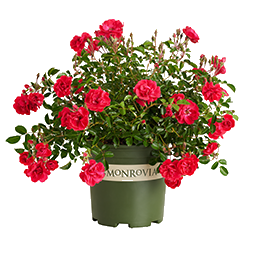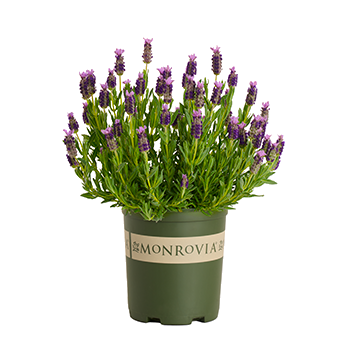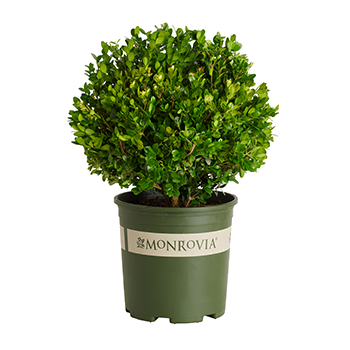Everyone loves a showy, flowering beauty that's hardy to zone 3 or 4 (unlike its mophead, colorful cousin H. macrophylla). It looks its best in autumn when the rest of the garden starts to wain. It works in schemes from cottage to formal and adapts to full sun or part shade. Some can be trained into a small tree or left as a big, blowsy shrub, and it's a romantic cut flower.
Need more reasons to love panicle hydrangeas? Here's another: the nectar-rich flowers of attract butterflies and bees, providing them with a vital food source during the late season.
Panicle hydrangeas (Hydrangea paniculata) can be large or compact depending on the variety. This means there's a perfect fit for most situations. Most have large clusters of white flowers in summer that fade to shades of pink or red before drying to beige in winter. If left to dry on the plant in fall, they’ll stay looking good all winter.
While we all appreciate the beauty of the more common mophead hydrangeas, panicle hydrangeas have distinct advantages. They thrive in full sun or morning sun, allowing a larger audience to enjoy their splendor. Since they produce blooms on new growth each summer, there's no risk of flower buds being harmed by winter cold. As a result, you can be confident of a stunning display every year.
If the only hydrangeas you plant are mopheads, you’re missing out on one of the late summer garden’s true pleasures. Ready to bring more panicles into your garden? Get our favorite varieties below, plus garden design ideas, care tips, and even late-blooming companion plant recommendations.
Color-Changing Panicles
Panicle hydrangeas typically undergo a color transformation from white to various shades of pink. Unlike mophead varieties, this change is not influenced by soil chemistry. Instead, it is triggered by fluctuations in air temperature. The color intensity is more pronounced in colder northern regions compared to warmer southern areas.
Check out the evolution of two of our favorite panicle hydrangeas below (Strawberry Shake™ and Candy Apple™) to get an idea of the transformation these beauties make from early summer through early fall.
Best Panicle Hydrangea Varieties for Long Blooming, Color-Changing Performance
During the later part of summer, when the garden begins to wind down, panicle hydrangeas (Hydrangea paniculata) become the focal point. They showcase magnificent blooms that continue to dazzle well into fall. We recommend considering these varieties for summer and fall garden interest.
Smaller Panicle Hydrangeas Ideal for Foundation, Massed, and Container Planting
Strawberry Shake™
Hydrangea
A gorgeous new, exclusive panicle hydrangea with sturdy stems that bear large white flowers that mature to a lovely pink. Long-lasting blooms are perfect for fresh or dried arrangements. Ideal for containers or as a foundation shrub in smaller gardens. Partial to full sun. Up to 5' tall, 4' wide. Zones 4-8.
Candy Apple™
Hydrangea
Another new, exclusive, and compact variety with show-stopping lime green flower clusters similar to Limelight. The long-lasting blooms age to pure white. Ideal for containers or as a focal point in smaller gardens. Partial to full sun. Up to 5' tall and wide. Zones 4-8.
Early Evolution
Hydrangea
Early Evolution is a unique panicle hydrangea with a stunning flower form and very compact habit. Its color transformation begins in late spring, starting as lime-white and ending as dark pink in September. Its compact size makes it versatile for garden beds. Partial to full sun. Up to 2' tall and wide. Zones 4-9.
Razzleberri™
Hydrangea
This new panicle hydrangea is remarkably robust and compact. It boasts large white flowers that persist throughout the entire summer and turn bright pink in the fall. Its smaller size makes it a fantastic choice for enhancing shrub borders. Partial to full sun. Up to 4' tall and wide. Zones 4-9.
Little Quick Fire®
Hardy Hydrangea
Showcases early blooming flowers approximately a month ahead of other hydrangea varieties. The pristine white blossoms gracefully transition to a captivating pink-red hue as summer unfolds. Partial shade to full sun. Up to 5' tall and wide. Zones 3-9.
Photo: Proven Winners
Little Lime®
Hardy Hydrangea
A dwarf form of the popular Limelight Hydrangea, Little Lime® sports the same great flower power. However, in a smaller package. Attractive green summer flowers turn pink in fall. Partial to full sun. Up to 5' tall and wide. Zones 3-9.
Large Panicle Hydrangea Varieties Ideal for Hedges and Back-of-the-Garden
Limelight Hardy
Hydrangea
An exciting hardy hydrangea from Holland, Limelight has unique chartreuse blooms in mid-summer that change to pink in fall. Good massed, as a hedge, in containers or as a cut flower. Partial to full sun. Up to 8' tall and wide. Zones 3-9.
Quick Fire®
Hardy Hydrangea
This panicle hydrangea exhibits an early bloom, appearing approximately a month ahead of other Hardy Hydrangea varieties, and reliably flowers every year. Its blossoms start off white and gradually transition to a lovely pink hue as the summer unfolds. Partial to full sun. Up to 8' tall and wide. Zones 3-9.
5 Garden Design Ideas for Panicle Hydrangeas
Create a Flowering Hedge
Some panicle hydrangeas fill in quickly forming a dense, flowery hedge that's perfect for separating property, covering a fence, or lining the back of the house. Use tall, wide varieties such as Angel’s Blush® Hydrangea and Limelight Hardy Hydrangea for tall privacy hedges. Or try a smaller variety like Strawberry Shake™ (pictured here) for a less expansive hedge. Plant a bit closer than typical to get a tight hedge. If privacy is a priority, back with an evergreen tree or shrub for year-round screening.
Team Player
The unique chartreuse blooms of varieties such as Limelight Hardy Hydrangea and Little Lime (pictured above) are ideal companions in just about any plant palette but shine in all-green planting schemes like what you see here. Get the look with a combination of dwarf conifers, fine-leafed grasses, hostas, Seaside Serenade® Bar, and hardy panicle hydrangeas for a cool and elegant look in early summer. Plus, these hydrangeas will turn white and then pink as the season progresses.
Creative Containers
The smaller size and vigorous growth of compact panicle hydrangea varieties like Strawberry Shake™ and Early Evolution are perfect for showcasing in a large container. Whether you have a small balcony or a spacious patio, panicle hydrangeas can add a touch of elegance and color to your outdoor space. Their large color-changing blooms create a stunning focal point. With proper care and regular watering, container-grown panicle hydrangeas look fantastic all summer long.
Provide Spectacular Scale
Many borders need height. As the season progresses, some flowering stalwart shrubs such as mophead hydrangeas and viburnums begin to fizzle out. At just that somber moment, panicle hydrangeas look their best, adding drama and scale to the garden. Impressive panicles of blooms, like the 10" long panicles of Angel's Blush® pictured above, change from white to pink, creating a striking visual impact that rejuvenates the garden and captures attention.
Anchor a Bed
It's true that some panicle hydrangeas can get very large but, no worries. As you see from our list of the best panicles, there are many more compact varieties that provide a strong vertical shape to mixed borders. The dwarf Early Evolution and slightly larger Candy Apple™ (pictured with Seaside Serenade® mophead hydrangeas above) are just two that won't overwhelm a border. When all else fades in winter, the dried blossoms keep it interesting.
5 Quick Panicle Hydrangeas Care Tips
- Light: Grow best in sun to partial shade. The ideal spot would be one that receives direct morning sun and afternoon shade.
- Soil: Not as fussy about soil pH as some hydrangeas. Although it must be fertile, well-fed, and slow to dry out. Amend with organic planting mix as needed when installing and add several inches of organic compost each spring.
- Mulch: Add a 2-3 inch layer in spring to preserve precious moisture in summer.
- Pruning: Blooms on new wood each year, so in late winter or early spring prune to encourage new growth. Larger varieties can be kept compact by pruning; this produces larger if fewer, flowers.
- Leave papery, faded flowers on stems in the garden for winter interest.
Favorite Late-Summer-Blooming Companions for Panicle Hydrangeas
Panicle hydrangeas are a fantastic choice for adding late-season interest to your garden. As other plants start to fade, panicle hydrangeas burst into bloom, stealing the spotlight with their showy panicles of flowers. Their long-lasting flowers persist well into the fall, extending the beauty of your garden. Panicle hydrangeas are particularly resilient, blooming each summer and avoiding the risk of damage from the winter cold.
For an even more dramatic and colorful show, plant them with late-blooming perennials and shrubs like our favorites below. Find more of our late-summer and fall-blooming favorites here.
La Barbe Bleue™
Bluebeard
With its fragrant, glossy yellow foliage, this plant infuses the summer landscape with a radiant warmth. The abundance of deep-blue flower spikes creates a striking contrast against the foliage, offering a rich and captivating display from summer through early fall. Full sun. Up to 3' tall and wide. Zones 5-9.
Grape Crush New
England Aster
A beautifully rounded mound adorned with dense clusters of deep purple flowers. This splendid variety offers a wonderful solution to extend the blooming season in your garden, providing vibrant color and serving as a nectar source for butterflies. Full sun. Up to 2' tall, 3' wide. Zones 3-8.
Sunset Celebration
Blanket Flower
Featuring enduring, vibrant red flowers that remain unfazed by the summer heat, this variety ensures a lasting display until frost. It thrives as long as spent blooms are consistently removed. This showy and low-maintenance addition adds a touch of charm and beauty to any setting. Full sun. Up to 16" tall and wide. Zones 5-9.
Great Reads for Late Summer and Fall in the Garden
- Sign up for our Grow Beautifully newsletter. You'll get design inspiration, garden tips, how-tos, and first access to exclusive guides, webinars, and plants.
- Fresh Color Combos for Fall Containers
- Brighten Your Early Fall Shade Garden
- Favorite Late-Summer and Fall-Blooming Perennials
- Best Small Trees for Fall Color: Favorites for Red, Orange, and Yellow fall foliage
- How to choose the best evergreen shrub for your landscape
- Light up your landscape with yellow trees and shrubs
- Container garden ideas for fall into winter
- Long-blooming perennials for a more beautiful landscape


























